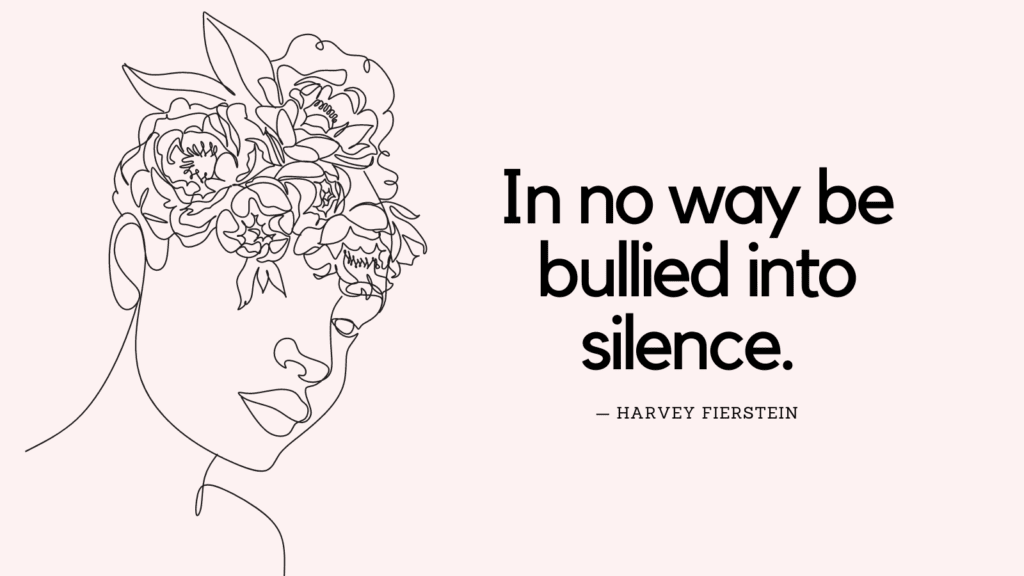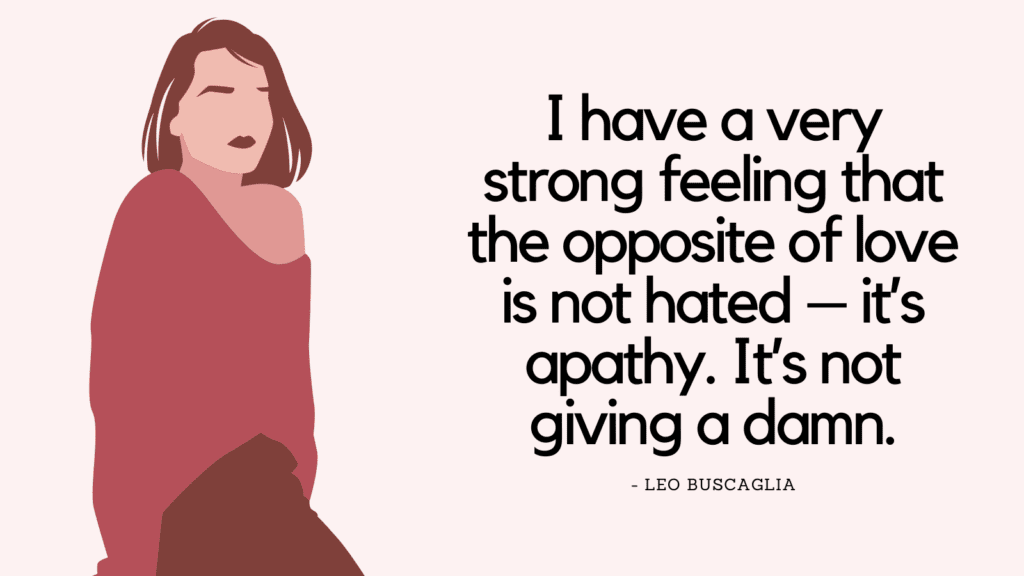This post contains some of the best suffering in silence quotes.
Suffering In Silence Quotes
1. “Friendship is not diminished by distance or time, by imprisonment or war, by suffering or silence. It is in these things that it roots most deeply.” — Pam Brown
2. “If somebody says what they want or what they need it gives the person the chance to say yes or no, instead of suffering in silence or depravation or whatever it is.” — David Duchovny
3. “In no way be bullied into silence. Hardly ever permit on your own to become made a sufferer. Acknowledge no one’s definition of one’s lifetime; define oneself.” — Harvey Fierstein
4. “It often requires more courage to suffer in silence than to rebel, more courage not to strike back than to retaliate, more courage to be silent than to speak.” — Booker T. Washington
5. “Living in a house where domestic violence goes on every day never feels like home. You don’t have to suffer in silence. I’m giving my full support to this website as it will give proper and practical advice about what to do if you feel afraid. Remember, you’re not alone.” — Beverley Knight
Related: The Difference Between Pain And Suffering (+Top 4 Tips On How To Embrace Pain & Stop Suffering)
6. “Some … have imagined that by arousing a baseless suspicion in the mind of the beloved we can revive a waning devotion. But this experiment is very dangerous. Those who recommend it are confident that so long as resentment is groundless one need only suffer it in silence and all will soon be well. I have observed however that this is by no means the case.” — Murasaki Shikibu
7. “Too many Americans who struggle with mental health illnesses are suffering in silence rather than seeking help, and we need to see to it that men and women who would never hesitate to go see a doctor if they had a broken arm or came down with the flu, that they have that same attitude when it comes to their mental health.” — Barack Obama
8. “You must cry out if you want help. It is no use whatsoever to suffer in silence. Who will succour the drowning man if he does not clamour for his life?”— Kamala Markandaya
9. “For many suffer but not everybody lives.” ― Laura Chouette
10. “So if there is any truth to it all – it is that everyone suffers in their own” ― Laura Chouette
Related: How To Heal Abandonment Issues? Top 15 Powerful Strategies For Fear of Abandonment Healing
11. “When mindfulness takes hold and the practice is established, suffering begins to melt.” – Blaise Aguirre & Gillian Galen
12. “Your fear of abandonment might be triggered by what seems like a minor rejection, like a friend canceling a plan to go to a movie together or a therapist running two minutes late for an appointment. This fear might lead you to become enraged, because you feel uncared for or unimportant. To others, this rage seems disproportional to the situation at hand, but for you, the suffering and fear are nearly intolerable.” – Blaise Aguirre & Gillian Galen
13. “If you train a specific muscle, it becomes stronger, and over time the training becomes easier. If you train yourself in a specific behavior, that, too, becomes easier to do, even if that behavior causes pain and suffering.” – Blaise Aguirre & Gillian Galen
14. “In the West, we tend to judge suffering as bad and view it as something we must avoid or quickly terminate. Many people with BPD spend much of their lives avoiding pain and suffering through destructive means that often lead to more pain and suffering, so that they never actually find the freedom they are looking for.” – Blaise Aguirre & Gillian Galen
15. “The first noble truth: Life means suffering. Few of us would disagree with this concept, because all of us have suffered, some of us more than others.” – Blaise Aguirre & Gillian Galen
Related: Best 99 Coping Skills (+FREE Coping Worksheets)
16. “For many, the suffering can be intolerable. We can feel that it’s unfair, and understandably want it to go away. “Life means suffering” simply acknowledges that suffering is a fact of life.” – Blaise Aguirre & Gillian Galen
17. “All of us will die, and our loved ones will die as well. How do we deal with such suffering? The key here is to remember that nothing is permanent. This can be difficult if you struggle with all-or-nothing, black- and- white thinking.” – Blaise Aguirre & Gillian Galen
18. “Suffering is just as much a part of our lives as non-suffering is. Even though it may not feel like it, our lives are always changing. When you experience joy, it, too, will pass. Joy and suffering flow in and out of our lives all the time.” – Blaise Aguirre & Gillian Galen
19. “From a Buddhist perspective, suffering is a fundamental part of the human experience and is considered a gift that reminds us of the changing nature of life. But if you are going to change suffering, you must be aware of it in its entirety, not simply how painful it is.” – Blaise Aguirre & Gillian Galen
20. “While paying attention to suffering can be painful, it is only by paying attention that you can understand suffering and change it.” – Blaise Aguirre & Gillian Galen
21. “The origin of suffering is attachment.” – Blaise Aguirre & Gillian Galen
22. “Getting what we want or expect rarely guarantees long- lasting happiness, and experiencing constant wanting or craving can be an exhausting way to live. Unawareness or lack of understanding of this process leads to suffering and pain; that is, we suffer when we want reality to be different from the way it is.” – Blaise Aguirre & Gillian Galen
Related: How To Feel Your Feelings? Top 9 Difficult Emotions To Cope With In Healthy Ways
23. “The cessation of suffering is attainable. Moving on from recognizing that suffering exists, the next idea is that we can overcome suffering and find happiness and peace. With newfound awareness, if we can let go of our craving and clinging, and begin to live in the present— living one day at a time without dwelling in the past or in an imagined future— we can all find greater happiness and free up energy to live our lives more fully.” – Blaise Aguirre & Gillian Galen
24. “That lonely silence can be a death sentence in the most severe cases.” – Margaret Robinson Rutherford
25. “But what about breaking the silence of perfectly hidden depression and beginning to invite others to get to know the new imperfect you?” – Margaret Robinson Rutherford
26. “If you’re a spiritual person, you may struggle with feeling as if you’re suffering because your faith is weak. You can become, in your own eyes, a failure as a believer.” – Margaret Robinson Rutherford
27. “The term “perfectly hidden depression” reflects this same thought: the official criteria for depression don’t have to be exactly met for depression to exist.” – Margaret Robinson Rutherford
28. “No one modeled healthy compartmentalization for you. Instead, you believe that you’ll break if you bend—if you admit vulnerability or hurt.” – Margaret Robinson Rutherford
29. “So, perfectly hidden depression may not be easy to see in yourself. For many, it’s not. Even if someone, such as your partner, points out how you didn’t cry when your friend died, or how you seem more and more uptight about how the kids are doing in school, or how you’re constantly busy—none of that sinks in. You say, again, “I’m fine. Really. It’s all good.”” – Margaret Robinson Rutherford
30. “Your depression, successfully hidden until now, can become impossible to contain.” – Margaret Robinson Rutherford
31. “You’re struggling with perfectly hidden depression in part because you haven’t asked safe, supportive people for what you need. Now is the time to build a support network.” – Margaret Robinson Rutherford

Pain vs. Suffering
Pain refers to the physical or emotional discomfort experienced as a result of an injury, illness, loss, or any adverse situation. It is a natural and often necessary response to protect ourselves from harm.
Suffering, on the other hand, is the mental and emotional distress that can arise from our perception and interpretation of pain.
While pain is primarily a sensory experience, suffering involves the way we mentally process and react to the pain. Suffering may include feelings of sadness, anger, frustration, and a sense of injustice or unfairness.
It’s important to understand that suffering is not solely caused by external circumstances but also by our thoughts, beliefs, and self-perception.
While we may not always have control over the pain we experience, we do have some influence over our suffering by shifting our mindset and building resilience.
Techniques like cognitive-behavioral therapy (CBT) can help individuals reframe their thinking patterns and develop healthier coping strategies. Additionally, mindfulness-based practices can teach individuals to relate to their pain and discomfort in a more accepting and compassionate way, reducing suffering.
Related: Top 21 Emotional Writing Prompts To Process Emotions



